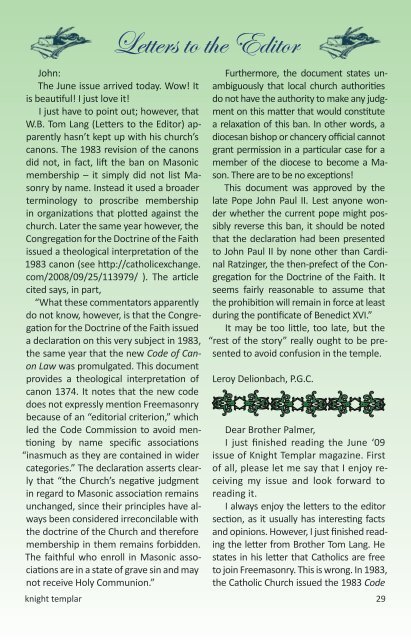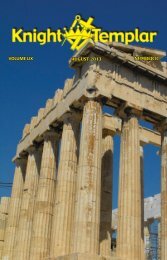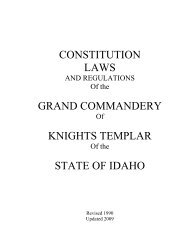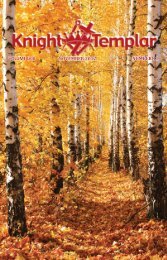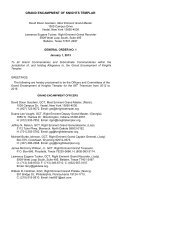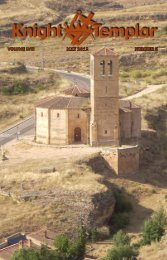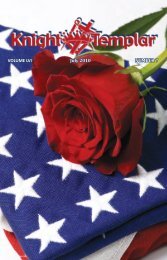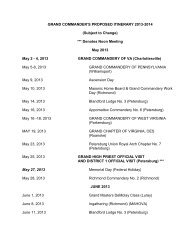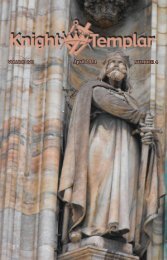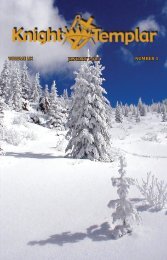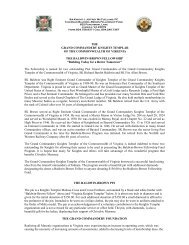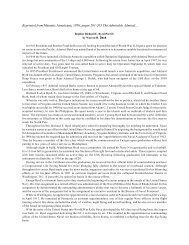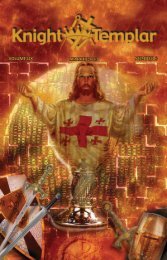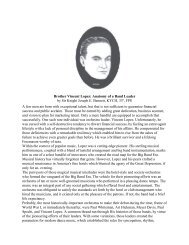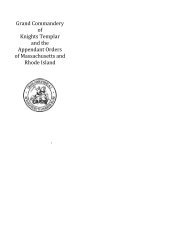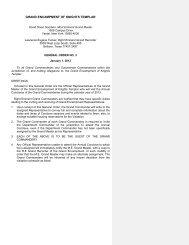AUG - Grand Encampment, Knights Templar
AUG - Grand Encampment, Knights Templar
AUG - Grand Encampment, Knights Templar
Create successful ePaper yourself
Turn your PDF publications into a flip-book with our unique Google optimized e-Paper software.
knight templar<br />
Letters to the Editor<br />
John:<br />
The June issue arrived today. Wow! It<br />
is beautiful! I just love it!<br />
I just have to point out; however, that<br />
W.B. Tom Lang (Letters to the Editor) apparently<br />
hasn’t kept up with his church’s<br />
canons. The 1983 revision of the canons<br />
did not, in fact, lift the ban on Masonic<br />
membership – it simply did not list Masonry<br />
by name. Instead it used a broader<br />
terminology to proscribe membership<br />
in organizations that plotted against the<br />
church. Later the same year however, the<br />
Congregation for the Doctrine of the Faith<br />
issued a theological interpretation of the<br />
1983 canon (see http://catholicexchange.<br />
com/2008/09/25/113979/ ). The article<br />
cited says, in part,<br />
“What these commentators apparently<br />
do not know, however, is that the Congregation<br />
for the Doctrine of the Faith issued<br />
a declaration on this very subject in 1983,<br />
the same year that the new Code of Canon<br />
Law was promulgated. This document<br />
provides a theological interpretation of<br />
canon 1374. It notes that the new code<br />
does not expressly mention Freemasonry<br />
because of an “editorial criterion,” which<br />
led the Code Commission to avoid mentioning<br />
by name specific associations<br />
“inasmuch as they are contained in wider<br />
categories.” The declaration asserts clearly<br />
that “the Church’s negative judgment<br />
in regard to Masonic association remains<br />
unchanged, since their principles have always<br />
been considered irreconcilable with<br />
the doctrine of the Church and therefore<br />
membership in them remains forbidden.<br />
The faithful who enroll in Masonic associations<br />
are in a state of grave sin and may<br />
not receive Holy Communion.”<br />
Furthermore, the document states unambiguously<br />
that local church authorities<br />
do not have the authority to make any judgment<br />
on this matter that would constitute<br />
a relaxation of this ban. In other words, a<br />
diocesan bishop or chancery official cannot<br />
grant permission in a particular case for a<br />
member of the diocese to become a Mason.<br />
There are to be no exceptions!<br />
This document was approved by the<br />
late Pope John Paul II. Lest anyone wonder<br />
whether the current pope might possibly<br />
reverse this ban, it should be noted<br />
that the declaration had been presented<br />
to John Paul II by none other than Cardinal<br />
Ratzinger, the then-prefect of the Congregation<br />
for the Doctrine of the Faith. It<br />
seems fairly reasonable to assume that<br />
the prohibition will remain in force at least<br />
during the pontificate of Benedict XVI.”<br />
It may be too little, too late, but the<br />
“rest of the story” really ought to be presented<br />
to avoid confusion in the temple.<br />
Leroy Delionbach, P.G.C.<br />
Dear Brother Palmer,<br />
I just finished reading the June ‘09<br />
issue of Knight <strong>Templar</strong> magazine. First<br />
of all, please let me say that I enjoy receiving<br />
my issue and look forward to<br />
reading it.<br />
I always enjoy the letters to the editor<br />
section, as it usually has interesting facts<br />
and opinions. However, I just finished reading<br />
the letter from Brother Tom Lang. He<br />
states in his letter that Catholics are free<br />
to join Freemasonry. This is wrong. In 1983,<br />
the Catholic Church issued the 1983 Code<br />
29


